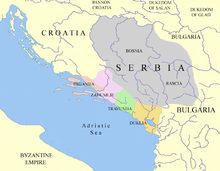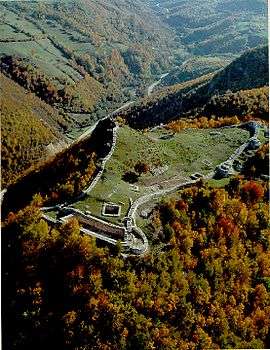Catepanate of Ras
The Catepanate of Ras (Byzantine Greek: Κατεπανάτο της Ρας) was a province (catepanate) of the Byzantine Empire, established around 971 in central Serbia, during the rule of Byzantine Emperor John Tzimiskes (969–976). The catepanate was named after the fortified town of Ras, eponymous for the historical region of Raška (Latin: Rascia). The province was short lived, and collapsed soon after 976.[1]
| Κατεπανάτο της Ρας Катепанат Рас | |||||||||
|---|---|---|---|---|---|---|---|---|---|
| Province of Byzantine Empire | |||||||||
| 971–976 | |||||||||
 Serbian lands according to Constantine VII (945–959) | |||||||||
| Capital | Stari Ras | ||||||||
| • Type | Catepanate | ||||||||
| Historical era | Middle Ages | ||||||||
• Annexation | 971 | ||||||||
• Disestablished | 976 | ||||||||
| |||||||||
History

The earliest possible date of its creation is 971, when Byzantine armies conquered Bulgaria and re-established Byzantine supreme rule over the interior of Southeastern Europe, including the central Serbian lands, as attested by the Chronicle of the Priest of Duklja. One of the newly formed administrative units was the Catepanate of Ras. It was established as a Byzantine stronghold in Serbian lands, but its territorial jurisdiction can not be precisely determined. The Catepanate was short lived, as the rest of the Byzantine rule in Bulgarian and Serbian lands. After the death of emperor John (976), a successful uprising started in the South Slavic provinces of the Byzantine Empire, led by Cometopuli, resulting in total breakdown of Byzantine power in the region.[2][3][4][5][6][7]
The sole primary source for the organization of the Catepanate is a seal of a strategos of Ras, dated to the reign of Byzantine Emperor John Tzimiskes (969–976). The seal belonged to protospatharios and katepano of Ras named John, who is the only known holder of the office of Catepan of Ras.[1]
See also
- Early Medieval Principality of Serbia
- Chronicle of the Priest of Duklja
- Sviatoslav's invasion of Bulgaria
- Byzantine conquest of Bulgaria
References
- Nesbitt & Oikonomides 1991, p. 100-101.
- Stephenson 2003a, p. 42.
- Stephenson 2003b, p. 122.
- Булић 2007, p. 54.
- Krsmanović 2008, p. 189.
- Madgearu 2008, p. 134-135.
- Madgearu 2013, p. 43.
Sources
- Булић, Дејан (2007). "Градина-Казновиће, резултати археолошких истраживања" [Gradina-Kazanoviće, Results of Archeological Research]. Историјски часопис (in Serbian). 55: 45–62.CS1 maint: ref=harv (link)
- Ćirković, Sima (2004). The Serbs. Malden: Blackwell Publishing.CS1 maint: ref=harv (link)
- Krsmanović, Bojana (2008). The Byzantine Province in Change: On the Threshold Between the 10th and the 11th Century. Belgrade: Institute for Byzantine Studies.CS1 maint: ref=harv (link)
- Кунчер, Драгана (2009). Gesta Regum Sclavorum. 1. Београд-Никшић: Историјски институт, Манастир Острог.CS1 maint: ref=harv (link)
- Madgearu, Alexandru (2008). "The mission of Hierotheos: Location and Significance". Byzantinoslavica. 66: 119–138.CS1 maint: ref=harv (link)
- Madgearu, Alexandru (2013). Byzantine Military Organization on the Danube, 10th–12th Centuries. Leiden-Boston: Brill.CS1 maint: ref=harv (link)
- Nesbitt, John W.; Oikonomides, Nicolas, eds. (1991). Catalogue of Byzantine Seals at Dumbarton Oaks and in the Fogg Museum of Art. 1. Washington, D.C.: Dumbarton Oaks Research Library and Collection.CS1 maint: ref=harv (link)
- Ostrogorsky, George (1956). History of the Byzantine State. Oxford: Basil Blackwell.CS1 maint: ref=harv (link)
- Stephenson, Paul (2003a). The Legend of Basil the Bulgar-Slayer. Cambridge: Cambridge University Press.CS1 maint: ref=harv (link)
- Stephenson, Paul (2003b). "The Balkan Frontier in the Year 1000". Byzantium in the Year 1000. BRILL. pp. 109–134.CS1 maint: ref=harv (link)
- Vlasto, Alexis P. (1970). The Entry of the Slavs into Christendom: An Introduction to the Medieval History of the Slavs. Cambridge: Cambridge University Press.CS1 maint: ref=harv (link)
- Живковић, Тибор (2009). Gesta Regum Sclavorum. 2. Београд-Никшић: Историјски институт, Манастир Острог.CS1 maint: ref=harv (link)